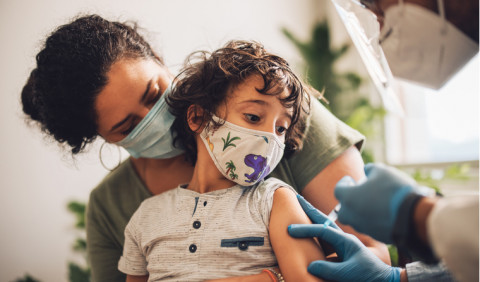
While the promise of ice cream is often enough to coax most kids into rolling up their sleeves and getting vaccinated, for some children in our community - particularly those on the autism spectrum - vaccinations, or even conducting a PCR or rapid test can be especially challenging.
COVID-19 vaccinations for children aged five to 11 opened last week. In this time 15.3 per cent of kids in this age group have been inoculated.
Autism Spectrum Australia ACT regional manager Maryanne Pease offered advice for families with children who may need additional help.
She stressed every child and every family was different but did share some words of wisdom.
"The key is that these things are challenging for all families [but] additionally challenging for children and families on the autism spectrum," she said.
Where possible, Ms Pease encouraged families to alert the person conducting a vaccination or test of any additional requirements.
"I do believe every health professional is really keen to make sure that the process for both the vaccination and the testing is as positive as it can be," she said.
"We want things to be as expected as possible, we use language about expected and unexpected a lot in the autism field. We know that having social stories or social scripts and visual supports can be really helpful, so that the young person understands really clearly what is going to happen. So families can be great at developing theseselves, or get therapists to help with that.
"It can be a series of photos, a series of pictures, a series of drawings, that show really clearly the steps involved. We want to share that with the young person well ahead of time, so that they get an understanding".
Ms Pease explained a social script needed to be very detailed, easy to follow and outline every step in the process "really clearly spelled out in a way that is appropriate for that young person."
"I would think in most cases, families would want to choose a familiar GP practice for a vaccination rather than an unfamiliar vaccination hub, because if the child's already familiar they will be happier."
Booking an appointment at the beginning of the day, requesting a quiet place to wait and putting the child's favourite TV program on were all options that may help reduce anxiety.
While getting a vaccination can be difficult for all children, Ms Pease said PCR tests and rapid tests were particularly challenging for kids with autism. This was especially evident for children who experienced sensory issues.
She said while parents could prepare their child ahead of time, a PCR test - with a nasal swab - was still "a yucky thing to have happen".
"Particularly if [the child] doesn't have that background about why they need to do that. Some young people on the spectrum are really aware of COVID-19 and the impact that it's having on their lives, but for some other children, they don't understand," she said.

Children aged between five and 11 can now be vaccinated. Picture: Shutterstock
"Suddenly having somebody stick something up their nose can be understandably really distressing."
Role play and videos of older siblings or other family members getting tested can be very useful in preparing autistic children for a COVID test.
"We find sometimes the video stuff, it's really useful because children are so good with technology, they can actually get control, they can watch it multiple times, they can go backwards and forwards, and they can really be comfortable with those steps," Ms Pease said.
"For some children the language, the words on the page, are really important. Others, we would really reduce the amount of language. It's really important to tailor what you do to the particular child."
from https://www.canberratimes.com.au/story/7582480/how-to-prepare-your-autistic-child-for-covid-vaccinations-and-tests/ or https://www.manningrivertimes.com.au/story/7582480/how-to-prepare-your-autistic-child-for-covid-vaccinations-and-tests/